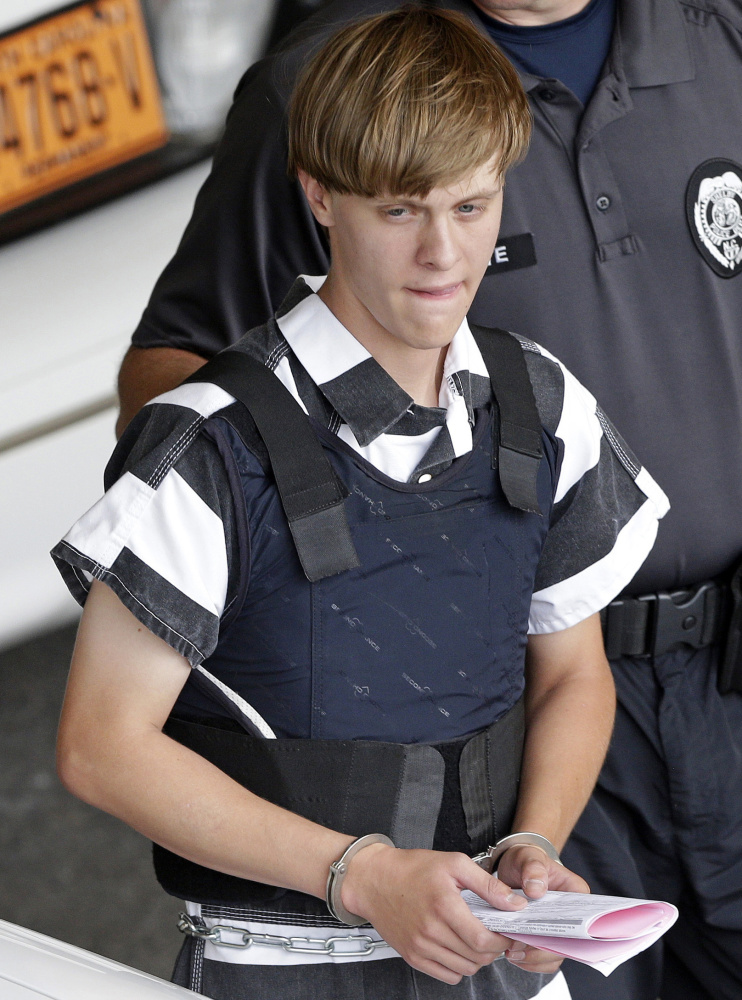CHARLESTON, S.C. — Jurors return to court Wednesday to begin considering whether Dylann Roof will receive the death penalty or life in prison for the 2015 massacre at a historic black church in South Carolina that left nine Bible study participants dead.
Last month, the same jury took less than two hours to find Roof guilty of all 33 federal counts against him, including hate crimes and obstruction of religion. After a three-week break over the holidays, jurors are now tasked with the ultimate fate of the 22-year-old who confessed his role in the shootings to FBI agents hours after his arrest.
Here’s what has happened in his trial and what to expect.
Prosecutors have said they might call as many as three dozen witnesses to make their case for why Roof, 22, should get the death penalty for the June 2015 slaughter at Emanuel African Methodist Episcopal Church in Charleston.
The defense put up no witnesses during the seven-day trial. The defense team repeatedly tried to work in evidence about Roof’s mental state, but U.S. District Judge Richard Gergel ruled that had nothing to do with Roof’s guilt or innocence.
Roof has been adamant on representing himself during the sentencing phase of trial, with his defense team staying on as legal advisers. The capital defense experts who represented Roof during the guilt phase have said they fear he won’t put up evidence that could potentially spare his life out of fear of embarrassing himself or his family.
Roof’s whole trial was put on hold for several weeks so that Gergel could hold a first competency hearing. During that proceeding, which was closed to the public over media objections, Gergel heard two days of testimony, after which he determined Roof was mentally competent to face trial.
After he was found guilty, a day before the scheduled start of the sentencing phase, Gergel held another hearing on Roof’s mental status, saying serious enough issues had been raised in filings made under seal that the judge needed to address them in court.
In deeming him competent both to stand trial for sentencing and to represent himself, Gergel gave Roof an extra day to prepare his case. Jurors now will return to court Wednesday.
Roof hasn’t ever said definitively why he wants to act as his own lawyer, but he’s left some clues along the way.
As early as last summer, Roof’s legal team filed a notice with the court that they planned to introduce evidence that their client suffers from a mental illness. Many subsequent motions have been filed under seal, purportedly to conceal sensitive information, but it’s likely further details on what lawyers planned to present are contained within.
It’s clear, from his own writings, Roof doesn’t believe in psychology. In a journal read in court during his trial, Roof called the specialty “a Jewish invention” that “does nothing but invent diseases and tell people they have problems when they don’t.”
As the jury selection process began last year, Roof said he wanted to fire his legal team and represent himself, ultimately keeping his lawyers for the trial phase but ditching them when it came time for sentencing. During discussions in court about Roof’s representation, his lawyers have said they feared their client wouldn’t introduce evidence that could potentially spare his life out of concern it might embarrass himself or his family.
Roof, who asked a judge at a hearing last week if he could file a motion limiting what prosecutors can introduce, also has been adamant a transcript of his competency hearing could not be released to the public.
“I know this is not a legal argument, but the unsealing of the competency hearing defeats the purpose of me representing myself,” Roof said.
Send questions/comments to the editors.



Success. Please wait for the page to reload. If the page does not reload within 5 seconds, please refresh the page.
Enter your email and password to access comments.
Hi, to comment on stories you must . This profile is in addition to your subscription and website login.
Already have a commenting profile? .
Invalid username/password.
Please check your email to confirm and complete your registration.
Only subscribers are eligible to post comments. Please subscribe or login first for digital access. Here’s why.
Use the form below to reset your password. When you've submitted your account email, we will send an email with a reset code.